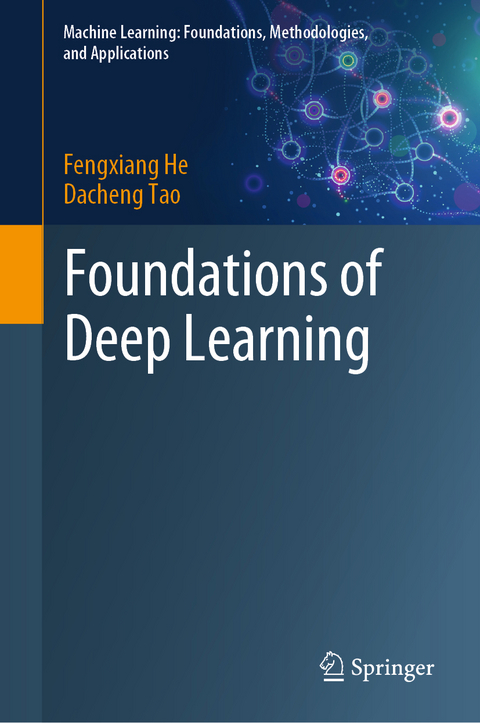
Foundations of Deep Learning
Seiten
2025
|
2024 ed.
Springer Verlag, Singapore
978-981-16-8232-2 (ISBN)
Springer Verlag, Singapore
978-981-16-8232-2 (ISBN)
- Noch nicht erschienen - erscheint am 25.02.2025
- Versandkostenfrei innerhalb Deutschlands
- Auch auf Rechnung
- Verfügbarkeit in der Filiale vor Ort prüfen
- Artikel merken
Deep learning has significantly reshaped a variety of technologies, such as image processing, natural language processing, and audio processing. The excellent generalizability of deep learning is like a “cloud” to conventional complexity-based learning theory: the over-parameterization of deep learning makes almost all existing tools vacuous. This irreconciliation considerably undermines the confidence of deploying deep learning to security-critical areas, including autonomous vehicles and medical diagnosis, where small algorithmic mistakes can lead to fatal disasters. This book seeks to explaining the excellent generalizability, including generalization analysis via the size-independent complexity measures, the role of optimization in understanding the generalizability, and the relationship between generalizability and ethical/security issues.
The efforts to understand the excellent generalizability are following two major paths: (1) developing size-independent complexity measures, which can evaluate the “effective” hypothesis complexity that can be learned, instead of the whole hypothesis space; and (2) modelling the learned hypothesis through stochastic gradient methods, the dominant optimizers in deep learning, via stochastic differential functions and the geometry of the associated loss functions. Related works discover that over-parameterization surprisingly bring many good properties to the loss functions. Rising concerns of deep learning are seen on the ethical and security issues, including privacy preservation and adversarial robustness. Related works also reveal an interplay between them and generalizability: a good generalizability usually means a good privacy-preserving ability; and more robust algorithms might have a worse generalizability.
We expect readers can have a big picture of the current knowledge in deep learning theory, understand how the deep learning theory can guide new algorithm designing, and identify future research directions. Readers need knowledge of calculus, linear algebra, probability, statistics, and statistical learning theory.
The efforts to understand the excellent generalizability are following two major paths: (1) developing size-independent complexity measures, which can evaluate the “effective” hypothesis complexity that can be learned, instead of the whole hypothesis space; and (2) modelling the learned hypothesis through stochastic gradient methods, the dominant optimizers in deep learning, via stochastic differential functions and the geometry of the associated loss functions. Related works discover that over-parameterization surprisingly bring many good properties to the loss functions. Rising concerns of deep learning are seen on the ethical and security issues, including privacy preservation and adversarial robustness. Related works also reveal an interplay between them and generalizability: a good generalizability usually means a good privacy-preserving ability; and more robust algorithms might have a worse generalizability.
We expect readers can have a big picture of the current knowledge in deep learning theory, understand how the deep learning theory can guide new algorithm designing, and identify future research directions. Readers need knowledge of calculus, linear algebra, probability, statistics, and statistical learning theory.
Introduction.- Background.- Conventional Statistical Learning Theory.- Difficulty of Conventional Statistical Learning Theory.- Developing Deep Learning Theory.- Generalization Bounds on Hypothesis Complexity.- Interplay of Optimization, Bayesian Inference, and Generalization.- Geometrical Properties of Loss Surface.- The Role of Over-parametrization.- Rising Concerns in Ethics and Security.- Privacy Preservation.- Fairness Protection.- Algorithmic Robustness.
| Erscheint lt. Verlag | 24.2.2025 |
|---|---|
| Reihe/Serie | Machine Learning: Foundations, Methodologies, and Applications |
| Zusatzinfo | 17 Illustrations, color; 4 Illustrations, black and white; XIV, 277 p. 21 illus., 17 illus. in color. |
| Verlagsort | Singapore |
| Sprache | englisch |
| Maße | 155 x 235 mm |
| Themenwelt | Informatik ► Theorie / Studium ► Künstliche Intelligenz / Robotik |
| Mathematik / Informatik ► Mathematik ► Angewandte Mathematik | |
| Mathematik / Informatik ► Mathematik ► Computerprogramme / Computeralgebra | |
| Schlagworte | Approximation • Artificial Intelligence • Deep learning • Deep Learning Theory • Generalization • machine learning • Optimization |
| ISBN-10 | 981-16-8232-1 / 9811682321 |
| ISBN-13 | 978-981-16-8232-2 / 9789811682322 |
| Zustand | Neuware |
| Informationen gemäß Produktsicherheitsverordnung (GPSR) | |
| Haben Sie eine Frage zum Produkt? |
Mehr entdecken
aus dem Bereich
aus dem Bereich
Buch | Softcover (2024)
REDLINE (Verlag)
20,00 €
Eine kurze Geschichte der Informationsnetzwerke von der Steinzeit bis …
Buch | Hardcover (2024)
Penguin (Verlag)
28,00 €


